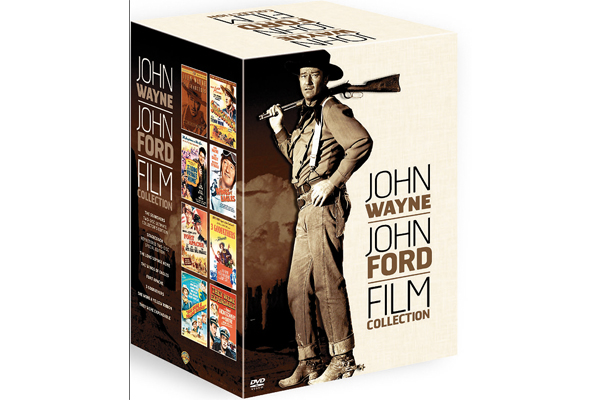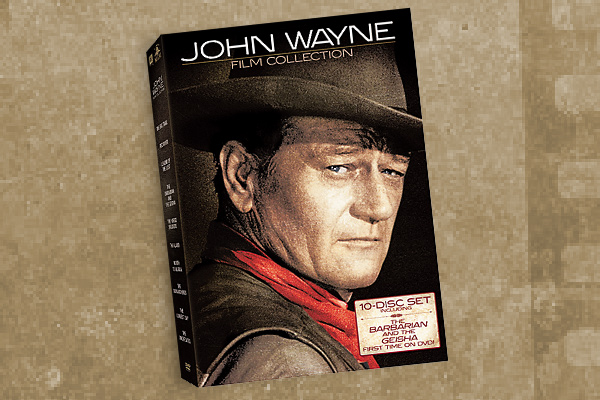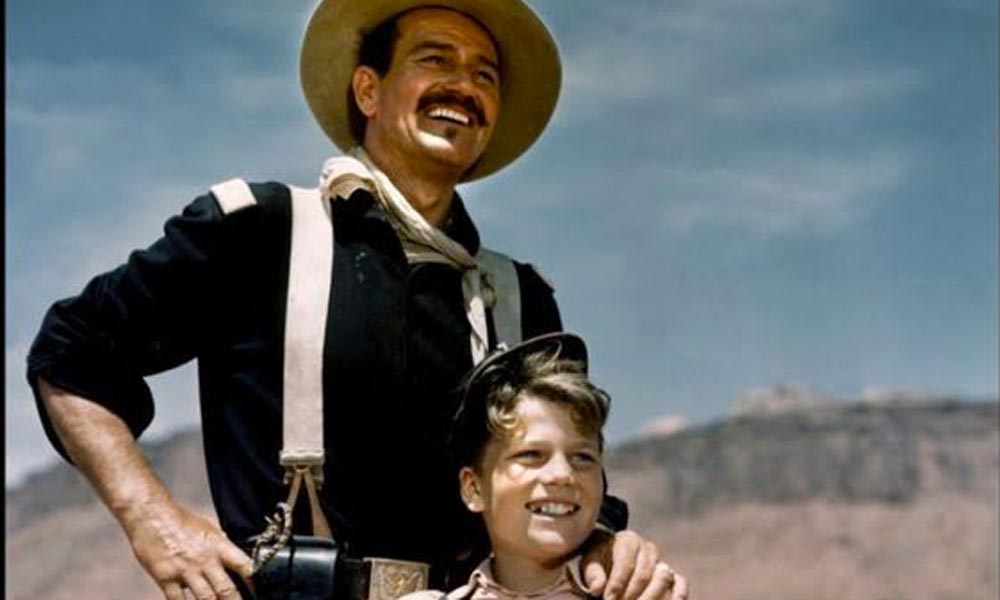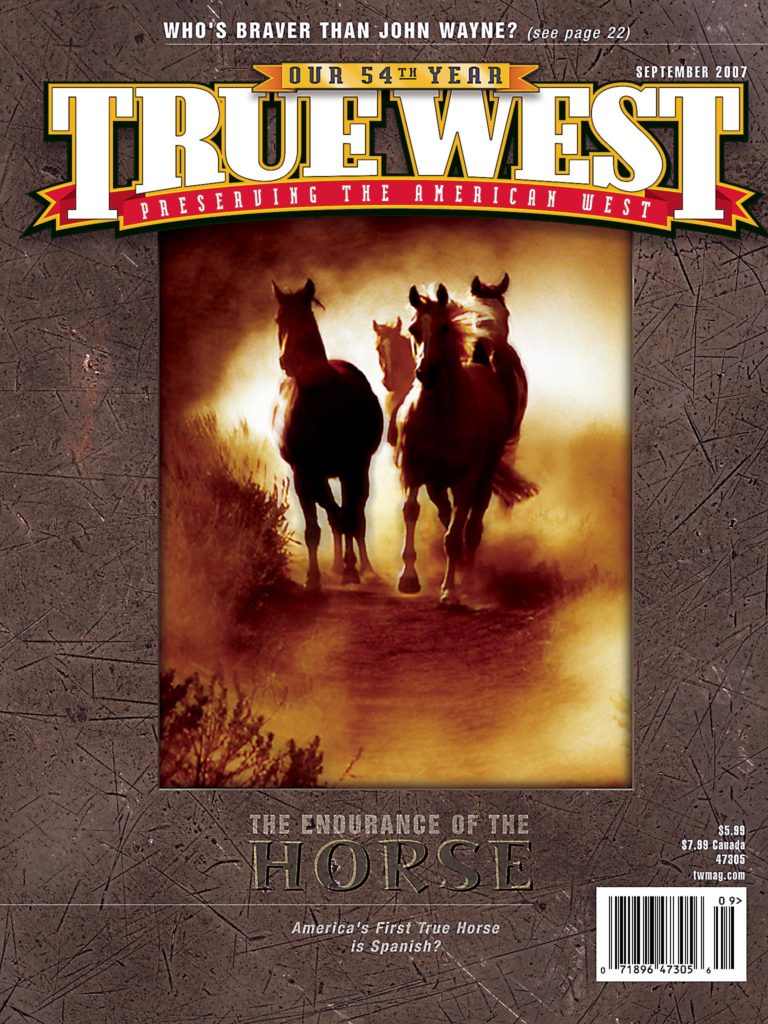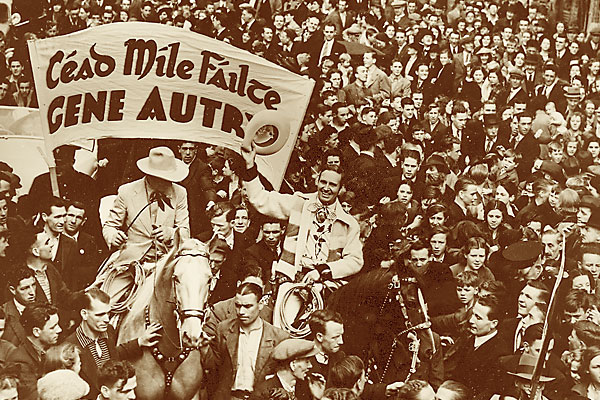 Who was Gene Autry? It’s a fair question. In his time, Gene Autry was many things to many people, but it’s fair to say that Autry was a man who, by dint of will and some modest musical talent, rose from his hardscrabble origins to transform the popular culture of the 20th century.
Who was Gene Autry? It’s a fair question. In his time, Gene Autry was many things to many people, but it’s fair to say that Autry was a man who, by dint of will and some modest musical talent, rose from his hardscrabble origins to transform the popular culture of the 20th century.
He influenced or changed everything he touched, and he had a hand in every area of popular entertainment except literature and theatre, unless comic books and rodeos count (and they do). Autry was the original king of all media.
He was textbook Horatio Alger, but multiplied by a factor of 50. He wasn’t the greatest singer, he couldn’t act much and he had to be taught how to handle a horse by stunt men and wranglers. But he knew how to pick good songs and perform them (“Rudolph, the Red-Nosed Reindeer,” “You Are My Sunshine”), learned to act well enough to play the same character, Gene Autry, for more than 20 years, and he had an innate instinct for marketing and promotion, which jibed nicely with his love of touring and performing. Autry is the only show business personality with five stars, representing five categories of activity, on the Hollywood Walk of Fame.
Audiences loved him. It didn’t matter that he wasn’t rugged, tall or tough. They liked his music and his modesty. As a Western hero, Autry personified decency, fair play, hard work and clean living.
When he wasn’t touring, broadcasting or turning out seven movies a year, he was battling studio exec-utives tooth and nail and carving a multi million-dollar empire. Gene Autry was a one-in-a-million everyman.
Holly George-Warren is the author of Public Cowboy No. 1: The Life and Times of Gene Autry (left), a book that opens the door wide on the phenomenon and the man, Orvon Gene Autry, who would have turned 100 on September 29 (Autry died in 1998). She is also the author of Honky-Tonk Heroes and Hillbilly Angels: The Pioneers of Country and Western Music and Cowboy: How Hollywood Invented the Wild West.
I spoke to Holly while she was visiting Los Angeles to participate in the opening of the Gene Autry Centennial Exhibition at the Autry National Center, a show that runs through January 13, 2008.
TW: I would imagine that a lot of interesting people with close connections to Autry have been coming forward to talk to you at the opening.
HGW: Oh yeah. It’s so crazy. I’ve just finished three days of book signings and even though I worked on the book for 10 years, people I was desperately trying to find have just now come out of the woodwork. Frankie Marvin was Gene’s best buddy going back to 1928 and worked with him his entire life. He also really helped Gene make it in New York. Frankie’s daughter came to meet me Wednesday night. It was amazing. So now I’m getting all these people’s phone numbers for whatever, whenever, you know, to add more material sometime down the road.
What kind of access did you have to Autry’s personal material?
It was so incredible. I had total complete access to everything—all his personal papers, files, contracts, everything. And then they put me in touch with everyone they had contact information for. The great thing was [no one asked] for editorial approval or anything. This was about as good as it gets.
But here’s the really amazing part: Gene, back in the early ’70s, bought all the negatives to all his Republic pictures, and, unbelievably, with all the film stuff they gave him, they also handed him all the files they had there that related to him, through all the years!
Yet your book makes it clear that Autry and the studio heads were constantly locking horns. They handed him all their paperwork?
All the way back to his original 1934 contract with Mascot Films [Autry’s first important film work, The Phantom Empire, was produced at Mascot]. There were contracts from 1936, ’37, ’38, through post-WWII. Inner office memos—stuff he never saw, would never have seen; telegrams, notes, letters. I saw this stuff, and I started shaking.
My favorite parts of the Autry story were the vicious contract and money fights with studio executives Nat Levine and Herbert J. Yates, and how cool Autry was throughout.
The one question I would have asked Gene, if I’d known then what I know now, “how did you feel when you read through all that vicious correspondence? All that stuff that was passing inside the organization about you, and the stuff they were doing when they were trying to replace you with Roy Rogers?”
Yates really did threaten to break the guy, and Gene had to have some kind of amazing courage and self confidence to go up against the guy. Roy Rogers never went up against them; even John Wayne wouldn’t stand up against Yates the way Gene did!
When you consider how well-documented Autry’s life was, it seems your hardest job was figuring what to leave out.
That is the damn truth—editing yourself is the hardest part. My contract was to turn in a manuscript of 100,000 words and 20 photos, and the book I turned in was 150,000 words and 120 photos. [Laughs]
Not only that, I had to completely bone up on the history of the recording industry, radio—Gene was way out in front of every advance in entertainment in the 20th century.
It was so much fun doing all the research—I could have just kept researching till the cows came home—but writing the damn thing was a nightmare. I could not eat, could not sleep; I lost 15 pounds.
How did you decide on your focus?
In the beginning, I wanted to cover his whole life, but then I realized there was no way I could do him justice.
The book was signed up by the music department at Oxford Press, and music is really my main background. Even his own memoir never really touched very much on that. So I really decided to go into a great deal of depth on his musical evolution.
I also wanted to detail his family history and include as much background as I could dig up because that had never really been covered or published anywhere.
I especially wanted to show that Gene was a true Westerner, and he did have the whole Western expansion/frontier spirit as part of his family background. Like most of the cowboy heroes, he really did come from that legitimate background. Ironically, Gene wanted to escape all that. He wanted to be a crooner, and he just wanted to have a better life.
Like Elvis, who wanted to sing Pop to escape his past but introduced a lot of kids to Blues and Hillbilly.
Yeah, Gene did slick up the sound. But I didn’t really feel that Gene was ever given his due for the huge contributions he made to Country-Western music. He was responsible for popularizing the sound all over the country and for elevating its stature. Up to then, they’d been marketing Country music as Hillbilly, hayseed hick-type stuff. Gene came along and segued from the Jimmie Rodgers Hillbilly songs into doing the grander Americana Western songs, the cowboy songs, with their dramatic lyrics and their fantastical element. He took that music to Hollywood and his movies, and then toured it all over the country through his popularity.
And he hired a lot of top regional Country bands for his films and tours.
More of Gene’s brilliant marketing instincts, because all those bands had huge local followings—it guaranteed regional audiences would come to see the movies, but it also gave those groups national exposure.
Your book also talks about Autry’s political influence.
It was mind boggling when I discovered, for instance, Gene’s Lyndon B. Johnson connection and how [Gene] was a behind-the-scenes guy with all these presidents, not to mention congressmen, the Speaker of the House and all that stuff. It was just amazing to me. And I had to include all of that too! [Laughs]
How did he manage to move in those circles?
It was through his incredible charismatic, gregarious nature that he was able to get in with everybody, from politicians to businessmen, merchandisers, whatever, who would then get caught up in the whole Gene Autry celebrity atmosphere.
You know, this book really started 10 years ago when I wrote a piece for The New York Times about Gene. I interviewed him when he was 89 and even then, at that age, I was so blown away by his charisma. He had this aura about him that was just magical and attractive—I was swept up by it, just in the hour or two I spent with him in his office.
That’s always been something of a mystery, why Autry was so popular when he was so unlike the other cowboy heroes.
He was kind of like the Garth Brooks of his day, really. But it’s interesting because he was a sex symbol. He did have this huge female following, especially when he was younger, in the ’30s. For the first time, he wasn’t the cowboy as paradigm of brute strength with the big strong jaw, and the big tough 6’3” guy—he was small in stature, had very soft features, soft jaw line, blue eyes, fair skin. I think he originated that other kind of sex symbol that led to Frank Sinatra and Bing Crosby—a softie, a musician, and that led to Elvis, too, with his pink suit and eyeshadow. [Laughs]
So I think that was another kind of subtle change in the culture, that people didn’t even realize came in with Gene Autry.
Something that came to me while reading your book is how much work Autry did, day in and day out.
The guy had road fever. He loved to be on the road, he loved entertaining people, he was a total sociable showman—he just loved being in front of an audience, and he would have kept going if he could have kept his audiences, but he lost them to Rock ‘n’ Roll.
He worked so hard, it was unbelievable. Even when he was in his 40s, doing movies, TV shows, radio shows, recordings, rodeos and his Western variety shows. And this was all pre-fax, pre-e-mail, pre-cell phone—he was juggling all these activities, not to mention all his business dealings.
Autry seems so much more interesting off screen than on.
He lived every minute to the fullest. I don’t think he got or needed much sleep. And that he wasn’t exactly a Boy Scout made him even more interesting. He was the Rock star of his day. He had gals throwing themselves at him. What was he gonna do? He’d say, “okay honey,” just like all the other Blues men and Jazz guys and Hillbilly guys. It’s life on the road! [Laughs]
The music business is legendary for exploiting local talents like Autry and leaving them penniless. How did Autry get his business savvy?
Partly I think it was because he was not afraid to take risks and he had this incredible intuition with people. He definitely got burned a few times, and he didn’t have great success with every venture. But the majority of the things he did, he brought in and trusted the right people who had vision and the acumen to pull it off. And he had a head for figures, and knew the value of a dollar. And he had such a hard life as a child—he came through desperate times.
I think he had such personal charm and intuition about people, and all these people he met became such huge powerful influences to help him make it.
And I think because he was a very loyal person, and he expected loyalty, he was able to foster these really long-term relationships and so it proved very beneficial; because he had these steady strong relationships with people who were really gifted and through them, he was able to branch out and find other people for other facets of his enterprises, and they would turn out to be good too.
What surprised you the most in the end?
How hugely influential he was on our culture in ways you don’t even realize, how hard he was working, how he cross promoted himself in ways that is now so much more commonplace. That synergy: read the book, see the movie; and the radio show would promote the movies; the sheet music would bump the music; the movies would be named after a hit song—the way all of his different mediums intersected, so he’d get complete saturation of the culture. He did that before anybody else.
Does Gene Autry still walk the Melody Ranch at night?
It’s funny—people were saying to me, “if Gene could see Deadwood and see what they’re using the Melody Ranch for, he’d turn over in his grave.” And I’d say, “no he wouldn’t! So long as he was able to rent it out and make money, he would have been fine.”
You know, when the Melody Ranch did burn [down] in the ’60s, he just left it the way it was, turned around and rented it to the TV show Combat. [Laughs]
https://truewestmagazine.com/western-library-kevin-hogge/


